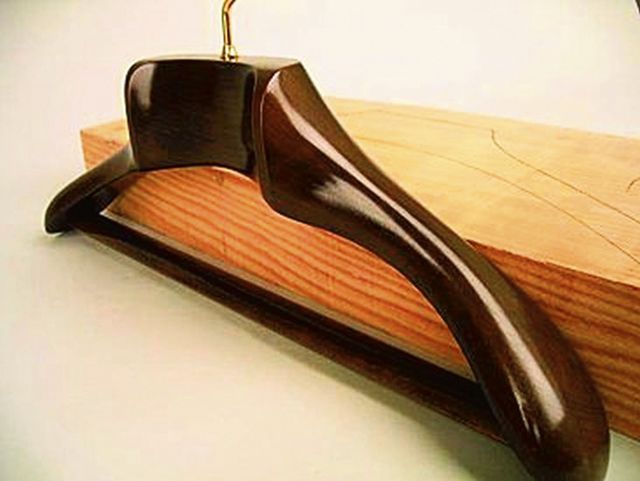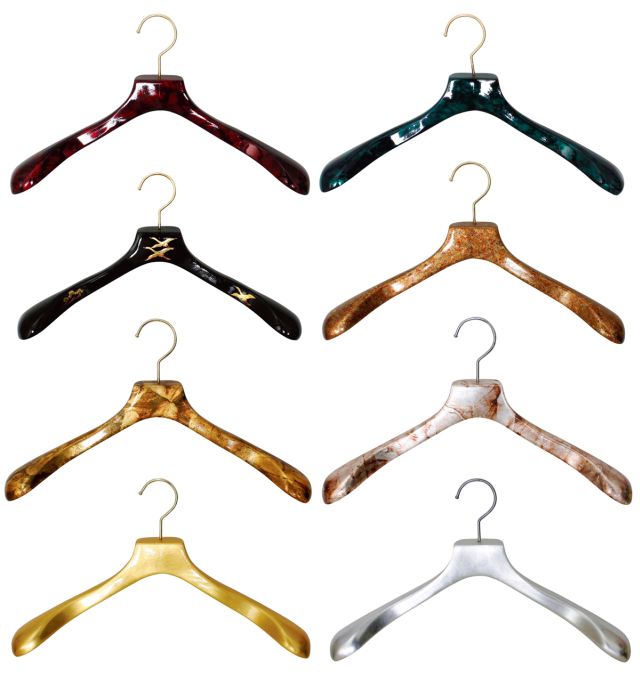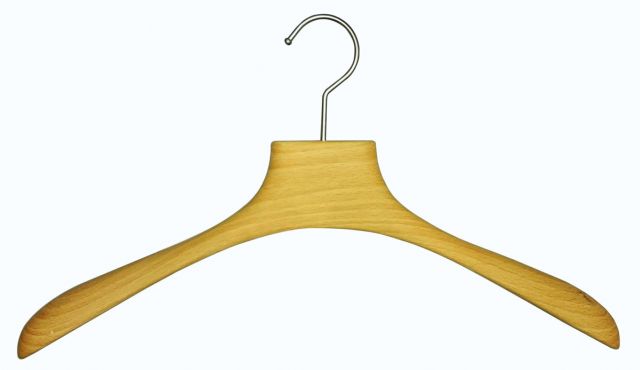Japanese hanger manufacturers have launched a B-to-C business. In light of the growing trend among Japanese consumers who care strongly about the clothes they wear of worrying about having the necessary storage space, manufacturers have been striving to sell wooden hangers, which are handmade by skilled craftsmen, light hangers that appear to be wooden but are in fact resin, and other such high-added-value hangers, in department stores and online.
Handmade by skilled craftsmen
The main force behind wooden hangers is Nakatakogei Co., Ltd., which has extended the B-to-C business via its own brand Nakata Hanger, founded 10 years ago. Since it opened a show room at a prime location in Minami-Aoyama, Tokyo, the company has gained greater name recognition, and its products have started to be used in leading department stores.
The company’s hangers, which use high-quality, European beech, were originally regarded by many high-grade brands, and even with B-to-C, consumers that were serious about clothes needed to store their clothes carefully in their wardrobes in a visually-appealing way. The main products cost 4,000 yen. The most expensive were 30,000 yen hangers which were carved by skilled artisans from a single piece of wood.

Nakatakogei: Each Nakata Hanger is carved from a single tree
The company president, Shuhei Nakata notes that “People rarely have the occasion to buy our hangers for themselves, but they would be happy to receive one from someone else. There is also high demand for our hangers as gifts, such as those given to wedding guests.” Recently, the company has started selling abroad as well. It has established agreements with companies that operate select shops in New York and Hong Kong to act as sales agents, and is looking now to develop individual demand.
Sanwa, a part of the Shimojima Group (Osaka) has created high-quality hangers using traditional crafts from the Hokuriku region, which it is selling via the web. Craftsmen make each and every one by hand, including attaching gold and silver leaf to the wooden hangers. The prices are mainly in the 2,000- to 7,000-yen range.

Sanwa: Wooden hangers made entirely by hand, including the attaching of gold and silver leaf
Resin hangers that resemble wood
Chana Company Co., Ltd. has commenced sales of its resin Balmy Hanger (retail price 300 – 1,000 yen) which it developed last year and which resembles wood in both appearance and touch. Balmy Hangers are made by transferring a wood-grain sheet onto resin that has been set, and are therefore durable, lightweight and high-quality. Small-lot production of the Balmy Hanger is possible by skilfully adapting the manufacturing process.

Chana Company: Balmy Hanger
A member of Chana’s Balmy Hanger team states “What the market wants is practical hangers that do not look cheap.” Conventional wooden hangers generally are joined at the centre, so they can be made by joining together two parts. Cracks also appear in the coating. If you carve hangers from a single tree, the resulting product has a high-quality feel, but it raises the cost. Resin hangers are light and practical, but their appearance and the holes in the reverse side appear cheap. Filling the holes in made them heavier than wooden counterparts, and raised the costs. With the development of the Balmy Hanger, Chana was able to overcome these challenges.
The company opened a showroom and café in Sendagaya, Tokyo, in May, the Balmy Café. Here, approximately 500 samples are displayed, and there is room for more than just sales talk with the customers; it was also opened as a retail space.
.gif)
Chana Company: A Balmy Hanger is barely distinguishable from a wooden hanger (on the right)
Enjoyed as an interior
A major player in the metal hanger market is On Off International Corp., and its handmade-style designs have been well received by customers. The company promotes its unique designs and functional hangers and display tools through its website and other channels. Lately, On Off International has received dozens of inquiries from consumers, and has started selling its products online. When there is demand for it, the company will even sell its hangers individually. Flexibly handling such requests has helped resulted in a steady sales performance.
One year ago, Kobel Co., Ltd. launched an e-commerce site, Kobel Closet. It develops unique designs for ladies, men, children and babies, and has a line-up of around 300 designs at present.
Kobel feels that “Rather than storing clothes on a hanger in a wardrobe, so they are out of the sight of the family, we want to create a space where customers can enjoy hangers as a part of the home’s interior, so that hanging clothes up is a pleasurable experience.” After around half a year from the launch of the site, the company started to increase its sales, which is now at “over 1,000,000 units per month, a result that exceeded expectations,” and there are clear signs that its business is expanding. Going forward, it intends to increase the variation of its product line-up, and expand sales.
